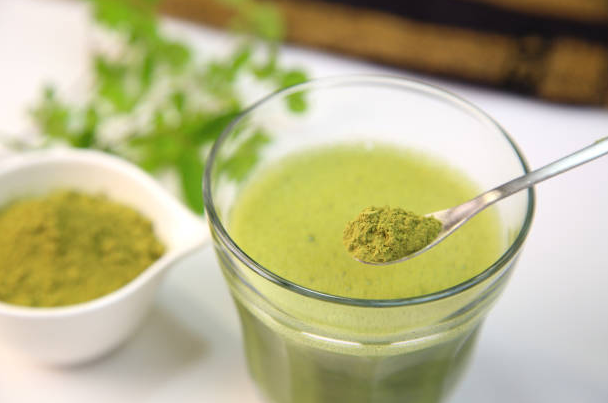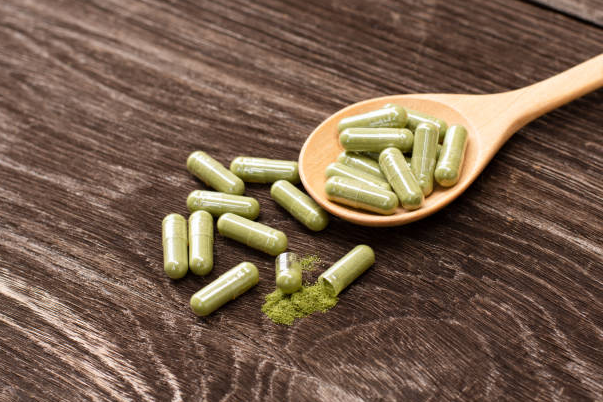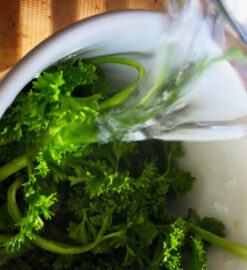Moringa Benefits for Stomach: Gut Health, Reflux & GERD
Moringa benefits for stomach health are increasingly recognized in holistic and scientific circles. This powerful plant has shown promise in supporting digestive function, calming acid reflux, and soothing gastrointestinal discomfort. In this post, we’ll explore how moringa supports the gut—especially for those struggling with GERD or acid reflux—then look at its broader benefits, nutritional profile, and how to consume it safely in powder or tea form.
How Moringa Supports Digestive Health and Helps with GERD / Acid Reflux

The soothing effects of moringa on the digestive tract come from its anti-inflammatory flavonoids, antioxidant compounds, and mild mucosal protection. Studies suggest that moringa leaf extract may help reduce oxidative stress in the gut lining, which can ease irritation and reduce acid damage. In animal and cell models, moringa has been shown to modulate gut microbiota, reduce inflammation, and protect against gastric ulcers. (PMCID – Moringa and gut microbiota)
Regarding acid reflux or GERD, the anti-inflammatory and antioxidant properties may help calm esophageal irritation. While human clinical trials specifically for GERD are limited, moringa’s general support for digestive balance and reduction of inflammation may provide additive benefit when paired with dietary and lifestyle changes.
Other Key Benefits of Moringa

Beyond digestive health, moringa offers a wide range of potential benefits:
- Blood sugar balance: Moringa has shown modest reductions in fasting blood sugar in small human and animal studies. (Healthline – moringa benefits)
- Energy & vitality: Its dense nutrient profile (vitamins, minerals, amino acids) supports overall metabolic function and energy.
- Immune and antioxidant support: Rich in polyphenols and antioxidants that can help combat oxidative stress.
- Anti-inflammatory support: May help with systemic inflammation, joint discomfort, and tissue repair.
- Potential benefits for sleep and stress: Its nutrient density and adaptogenic potential may help calm the nervous system (though more research is needed).
Nutritional Profile of Moringa Powder

Moringa leaf powder is incredibly concentrated. Its leaves contain more vitamin C than oranges, more vitamin A than carrots, more calcium than milk, and high levels of iron, protein, and potassium. (PMC – Moringa Nutrition Review)
In one nutritional analysis, moringa leaf powder was found to have ~12% dietary fiber, ~25–30% protein content, and a broad spectrum of B vitamins, minerals (magnesium, zinc, calcium, potassium), and phytonutrients. (MDPI – Moringa Leaf Powder Composition)
How to Use Moringa (Tea, Powder, Capsules)

Tea Form
One option is moringa tea made from dried moringa leaf or tea bags. Steep in hot (not boiling) water for a few minutes. Tea offers hydration and milder effects, making it gentler on the stomach for sensitive individuals.
Powder / Capsules

Moringa powder is more potent. You can add it to smoothies, soups, or take it in capsule form. Choose high-quality, organic, third-party tested brands to avoid contaminants or heavy metals. Start with 1 teaspoon (or a standard capsule dose) daily and observe how your digestion responds. Over time, doses up to 1–2 teaspoons or equivalent are common in traditional use.
Tips and Safety Considerations

Although moringa is generally safe for many people, consider these precautions:
- Start slowly—high doses may cause digestive upset in some individuals.
- Avoid use during pregnancy in excess amounts (especially raw leaves or bark) without medical supervision.
- People on iron-sensitive treatments should watch moringa’s high iron content.
- Always choose reputable brands with third-party testing to minimize risk of contamination.
Final Thoughts

When used thoughtfully, moringa can be a powerful ally for digestive support, especially for those dealing with GERD, acid reflux, or general gut irritation. Its nutrient density and anti-inflammatory properties make it useful beyond digestion—supporting energy, immune function, and overall wellness. Using organic, high-quality forms—in tea, powder, or capsule—lets you harness moringa benefits for stomach without overdoing it. Pair it with a clean diet, mindful eating, and medical oversight for best results.
Sources:
- PMC – Moringa and gut microbiota: pmc.ncbi.nlm.nih.gov
- Healthline – 6 Science-Based Benefits of Moringa: healthline.com
- PMC – Moringa Nutrition Review: pmc.ncbi.nlm.nih.gov
- MDPI – Moringa Leaf Powder Composition: mdpi.com
- WebMD – Moringa Overview: webmd.com





Leave a Reply